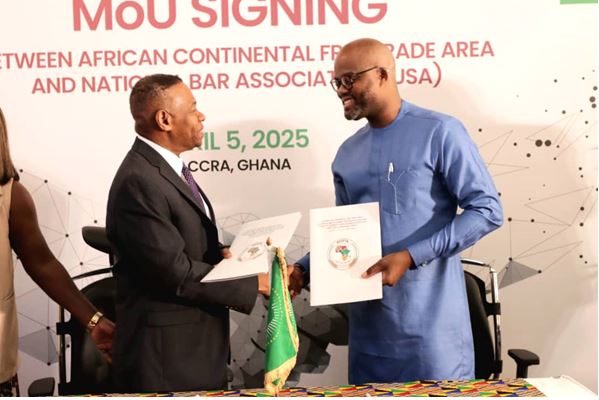By Kizito CUDJOE
The African Continental Free Trade Area (AfCFTA) head has said that new U.S. tariffs on African exports highlight an urgent need for the continent to strengthen its own economic foundations and reduce reliance on foreign markets.
Wamkele Mene, Secretary-General of AfCFTA, noted that the measures imposed by Washington serve as a wake-up call for African governments to fast-track regional trade integration and build self-sufficiency.
“We have begun to do that in a number of areas: in terms of payments, working with the Afriexim Bank we have established a Pan-African Payment and Settlement System which enables payments in local currency instantaneously at a fraction of the previous cost. This enables Small Medium Enterprises (SMEs), youth entrepreneurs to access the entire continent of Africa, paying for their transactions in local currencies,” Mene said.
He argued further that this not only reduces trade costs in Africa but also ensures SMEs are included in the new trade system, among other benefits.
The AfCFTA head, who was speaking during a Memorandum of Understanding (MoU) signing with the National Bar Association (NBA) of the US in Accra, also recognised the contribution of women-led SMEs to the continent.
“Over 450 million jobs in Africa are created by women SMEs and they are contributing over 60 percent of Africa’s combined Gross Domestic Product (GDP),” he observed.
Against this backdrop, he said the successes recorded since AfCFTA’s coming into place as well as its overall liberalisation objective, among others, make the continent better placed to turn the emerging ‘tariff crisis’ into an opportunity.

“There is absolutely no reason why we should be crying about a tariff of 10 percent on all of us, when in fact when you look at the trade statistics, our export profile under AGOA to the US – minerals, petroleum, vehicles, cashew nuts – signals that we more than just exporters of unprocessed commodities.”
Therefore, he said the challenge put to the continent by the U.S. serves as an opportunity to consolidate and build a market that will enable the continent to stand on its own ‘economic feet’ and produce for itself without disengaging from the global economy and global supply chain.
The U.S. recently announced a revised tariff structure affecting a range of imports, including some from African countries. While details vary by product, it is seen that the move could impact sectors such as textiles, agriculture and light manufacturing – industries where several African economies have been working to build export capacity.
It is for this reason that Mene said the development underscores the need to implement the AfCFTA agreement more aggressively. The trade pact, which came into force in 2021, aims to create the world’s largest free trade area by connecting 55 African countries with a combined GDP of` US$3.4trillion.
He therefore stressed the partnership with NBA’s importance, “because it enables us to leverage on like-minded institutions in the US, like NBA”.
The MoU with NBA, he said, will focus on collaboration, identifying investments and trade opportunities, building capacity for a range of different trade-related areas including dispute settlements and ensuring that the diaspora are advocates for Africa’s endeavours.
The latest MoU is said to be the third signed with an institution in the US, following others signed with the U.S. Chamber and the U.S. Corporate Council on Africa. This engagement seeks to deepen cooperation with the African Diaspora and support legal and economic partnerships under the AfCFTA framework.
The NBA president, Wiley Adams – who led the five-member delegation to sign the partnership agreement – also recognised the significance of AfCFTA particularly in the face of global economic uncertainties while stressing the continent’s need to prioritise integration and self-reliance.
To achieve this, he also noted a need to have legal professionals at the centre of implementing the trade agreement and added that the diaspora has a vital role to play in these efforts.
“We are not disconnected from Africa’s future, we are a part of it. We bring legal expertise, global networks and a deep-rooted passion to see Africa rise. Now more than ever, Africa’s success is the world’s success,” he stated.










